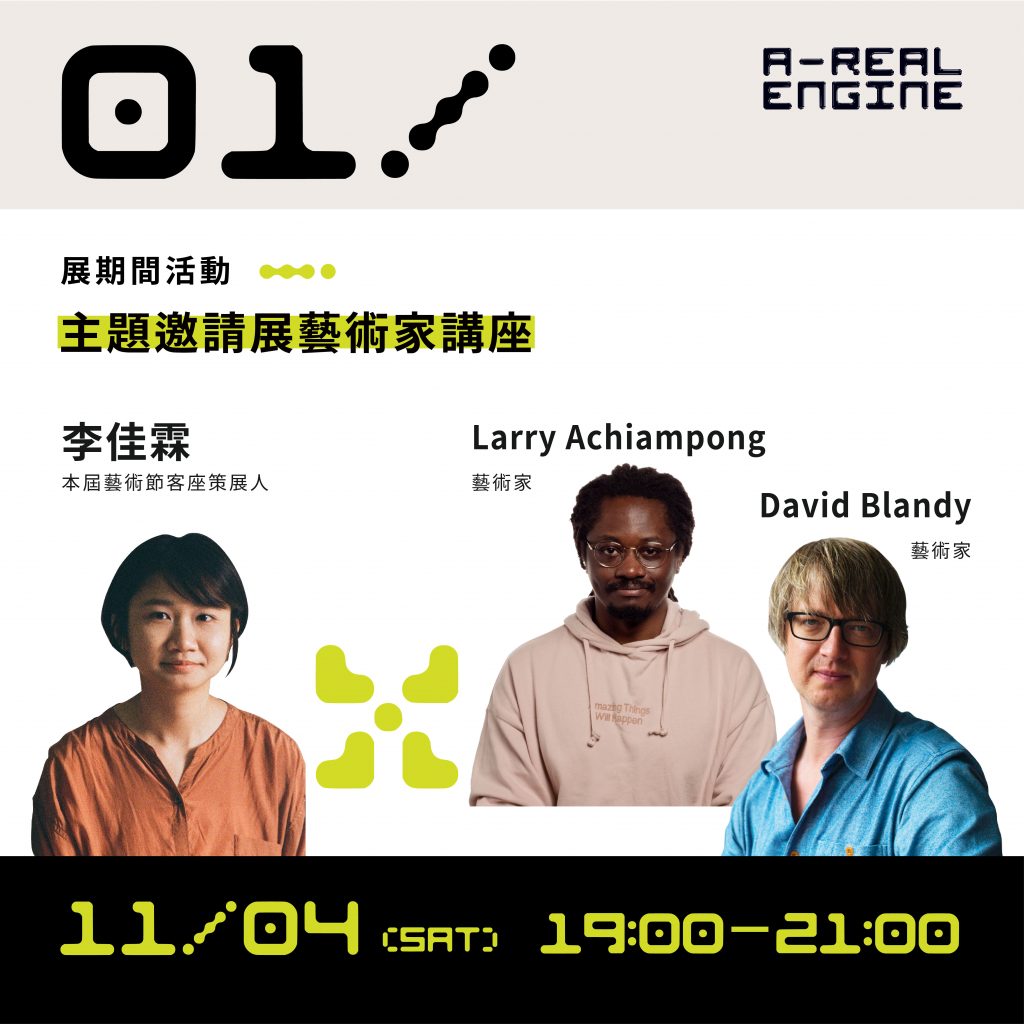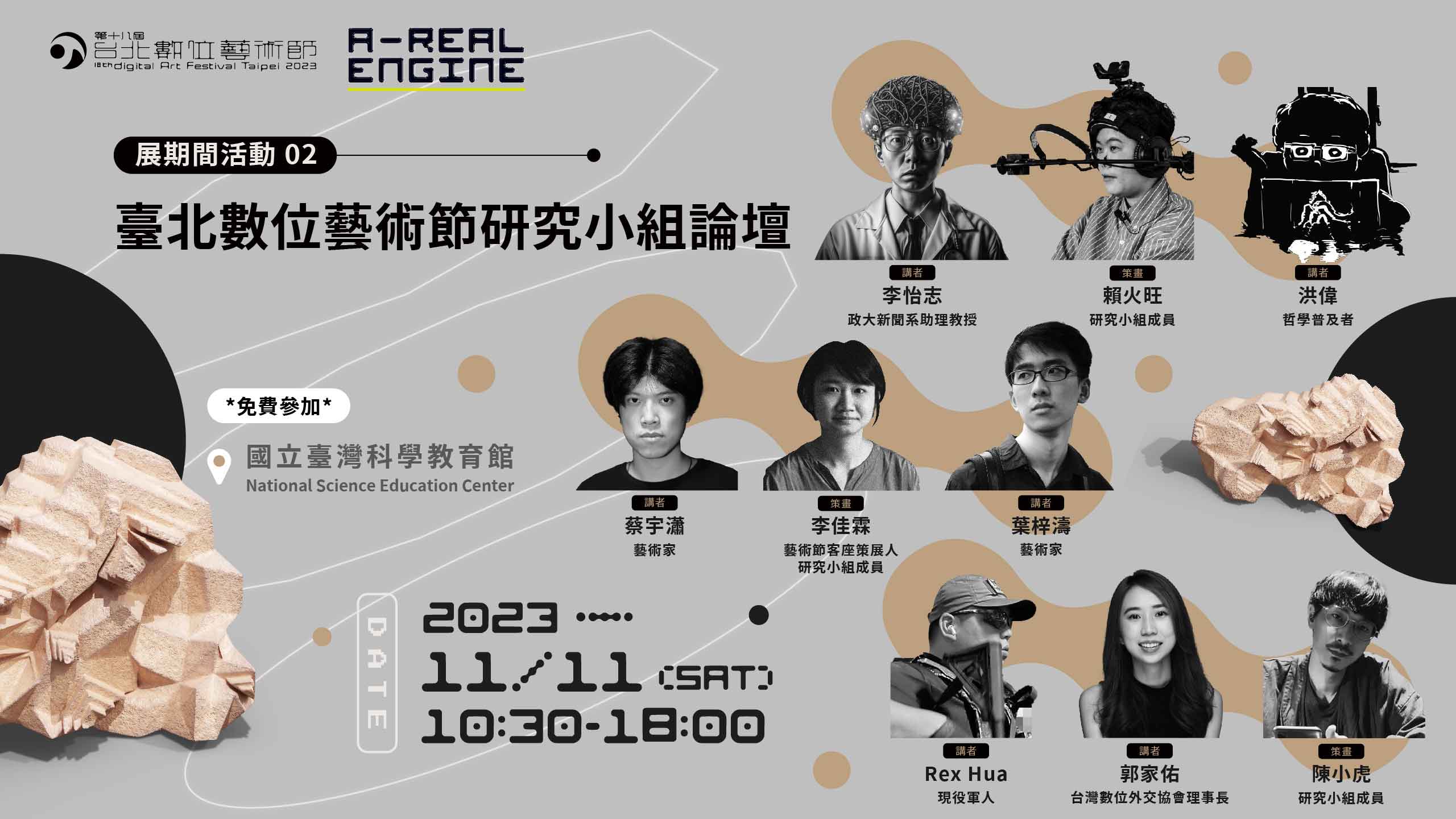
Venue|“A Warm Little Pond” at National Taiwan Science Education Center (5th Floor Permanent Exhibition, South Side, NO.189 Shihshang Road, Shihlin, Taipei)
Date and Time|11/11(Sat.) 10:30-18:00
Language|Mandarin
In response to Taipei Digital Art Festival’s invitation, a research team composed of Yi-Shan SHIH (a.k.a Prof. Ho-Wang LAI), an artist-researcher who exhibited in the 2022 Taipei Digital Art Festival, Chia-Lin LEE, the current curator of this year’s thematic exhibition, and Hsiao-Hu CHEN, a senior game player, has been formed to draft and plot the forums. Based on their experiences with distinctive creations, curations, and video/airsoft games, feedback with “gamification” as the keyword was provided. After half a year of periodic online sharing, the three had connected the contents of their respective focuses and concluded three forum subtopics – Yi-Shan SHIH’s “When AI Becomes the Population Base…”, Hsiao-Hu CHEN’s “Wars and Games – The Perceptual Structure of Simulation and Training”, and Chia-Lin LEE’s “Contemporary Arts and Games”. In addition, domestic and international lecturers of different fields will be invited to join the dialogues and exchange their views regarding the subtopics.
Subtopic I: When AI becomes the population base…
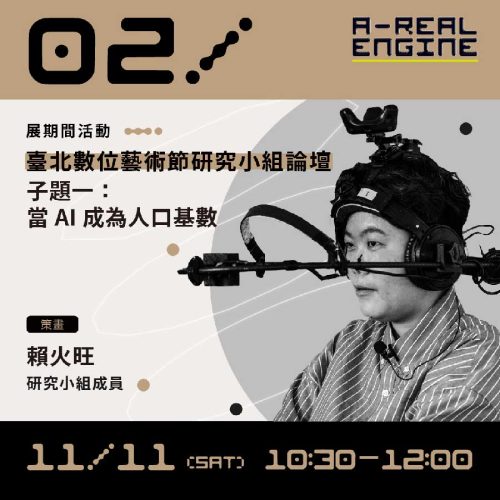
Curator/host: Prof. Ho-Wang LAI
Speaker: Wei HUNG and Richy LI
The Mandela Effect is an urban tale or conspiracy theory that refers to the inconsistency between collective memories and historical facts. In 2021, a game type called the “Mandela Catalogue” emerged in the field of electronic games, which is the extension of the collective memory error in the “Mandela Effect”. Most of the games of this type are usually characterized by Analog Horror[1]. The Mandela Catalogue is a series of works created by the YouTuber Alex Kister[2], and the reasoning narratives derived from it usually contain the game mechanics of “pseudo-person identification” – i.e. a game to identify the person and the imposter. The worldview in this mechanism is mostly centered on a (fictitious) test software divulged from (a certain department) in the United States. The function of the software is: to test whether you can identify “the real persons”. In fact, it is a game mechanics that explores the circumstances in which human beings doubt their own existence. It’s popularization also pronounces that: in 2023, the year of the AI application explosion, we already entered into the “final critical point in which humans fool machines.”
Is it possible for humans and machines to have a new “interactive mode” when “machines can self-generate”? We are already tip-toeing at the boundary of “reality mechanism” and “digital engine”, an era in which the boundaries of everything, from the working methods to the universal technologies, are gradually blurred and obscured. Within this social context: is it still necessary to pursue the boundaries between humans and machines, reality and virtuality? In most of the recent game development, the import of AI generative personalities is substantially adding up “game experiences” (or meanings) for the many digital game players. The consequence of such testing is relatively an enlightenment to study the environment of “machine society” or the next-up occurrence of “symbiosis (of human beings) with machines” — because such a generation is not yet away from the “chatting mode”. [3]
[1] A horror style that imitated the image analog signals of the 20th century.
[2] Alex Kister’s YouTube channel: https://youtube.com/@MandelaCatalogue
[3] In the video, it is a NPC experiment driven by ChatGPT.
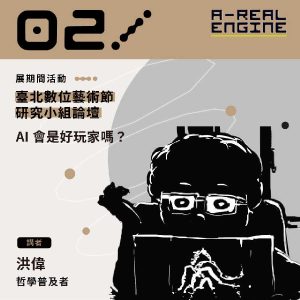
Topic: Will AI be a good player?
Speaker:Wei HUNG
In terms of our discussion, firstly, the relationship between traditional games and players will be explained. It is followed by other games related to different languages, including computer games. I will introduce cases in which AI is the player in the games, trying to make the audience understand the potential of AI. Next, I’ll explain the unique position of the “players” for the games, especially in multiplayer games. Lastly, I’ll come back to the type of player that AI may become and what are our expectations towards them.
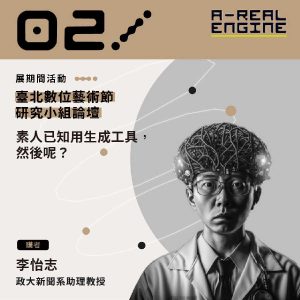
Topic: Amateurs know about generators, and then?
Speaker: Richy LI
Generative art tools are tools that have been used by ordinary people since 2022. Some amateurs have started using this tool for their creations and really enjoyed it. However, should we consider amateurs’ works made with generators as art? Are the amateurs more imaginative? Can amateurs visually express their thoughts and feelings? Regarding these newly emerged interrogatives, is the threshold between amateurs and artists blurred or will there be a neZAw boundary?
From the standpoint of an amateur, Richy LI intends to examine the possible consequences of the usage of generative art tools by amateurs from his personal and teaching experiences.
Subtopic II: Wars and Games - The Perceptual Structure of Simulation and Training
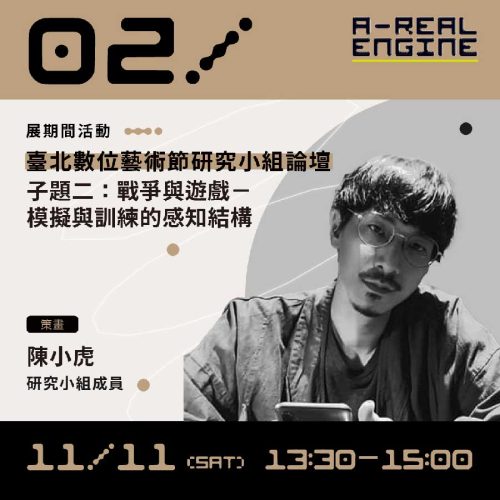
Curator/host: Hsiao-Hu CHEN
Speakers: Rex HUA and Taiwan Digital Diplomacy Association
In early 2023, the Center for Strategic and International Studies (CSIS) released a public report “The First Battle of the Next War: Wargaming a Chinese Invasion of Taiwan” which contains a detailed description of using wargaming as the study method to analyze cross-strait crisis. In electronic/computer game development, the simulated techniques and experiences, along with the development and popularization of hardware, have unquestionably become a category. The army uses airsoft guns as tools to train and fight professional soldiers. Airsoft players have also introduced more and more military tactics and equipment in order to accentuate the real battlefield experiences within the gameplay scene.
However, war and games should have completely different cultural frameworks and values, pursuing distinctive goals. The key questions in this project are: how can both parties overlap during the development process? What are the impacts of such a context in a country that has been in peace for a long time?
Through the symbol framework established by N. Katherine Hayles in”How We Became Posthuman”, this study aims to ransack the analogy between modern warfare and gaming methods and to explore the expansion and interference of these two completely different perceptual structures within the contemporary complex social media as well as to further construct new subjects and perceptions in the network era.

Topic: Reality Deviation of the Warfare under the Public’s Eyes
Speaker: Rex HUA
The political and military situation in Taiwan appears to have a unique position under the international context; however, it was not until 2002, when Russia launched military action against Ukraine, that the real risk of military conflicts was brought to the public. As a result, understanding and preparing for military conflicts have gradually received attention and discussions among the public.
The Taiwan Strait has been free from full-scale military confrontations for nearly six decades. However, in comparison to the political issues, Taiwanese society is relatively closed-minded and conservative toward military and national defense information. Against the backdrop of not having sufficient experience and intelligence, public attention and discussions are limited to fragmentary resources found on the internet, in media reports, and within the entertainment industry. Additionally, the warfare-specific information provided by a dedicated few often cannot reach a larger audience. As a result, when compounded with the existing political ideology deviation in society, the civilian understanding of warfare presents a considerable deviation intrinsically.
In this talk, we will use “Wargame: Red Drago” (2014) to discuss this deviation. Through the game simulation, we will analyze how the public thinks about warfare when it is presented under everyone’s eyes.

Topic: The Future of Cyber Defense – A Lesson from Ukraine for Taiwan’s Digital Resilience
Speaker: Taiwan Digital Diplomacy Association
The Internet is the front line of war. Are you prepared? Are you curious about how you can defend Taiwan by using digital forces as an ordinary civilian?
The “Cyber Defense Network Project” was launched by Taiwan Digital Diplomacy Association in 2023 with the aim to elevate the digital resilience of Taiwanese citizens. We believe that regardless of your identity, background, or location, you are capable of maximizing your potential to be a reliable information communicator upon the outbreak of war and contribute positively to the nation’s proper functioning.
In this talk, we will share different websites and social media plans initiated by Ukrainian citizens during the war. We will learn how the Ukrainian society drove the network synergy and drafted clear operation goals for information warfare, from refugee accommodation, human resource matching websites, the usage of AI tools for fact-checking, and virtual curation for Ukrainian fund-raising. Through the lessons learned from Ukraine, we will explore the possibilities of public-private collaborations in emergencies through the Internet, from the society and media to the government, as well as websites and social media plans suitable for Taiwan.
Supplementation
Check~ Launch a cyber attack on Russia with a game!
Did you know that games like “2048” have their own roles during wartime? The tech NGO “Play for Ukraine” made a special game for the public. Every swipe in the game will result in a DDoS attack in Russia, interrupting the operations of their network devices.
ChatGPT is not enough! Ukraine has also introduced AI to do fact-checking!
Before the outbreak of the Russo-Ukrainian War, there was already a lot of misinformation and fake news attacking Ukraine. Henceforth, different fact-checking platforms have emerged, and with the introduction of AI and machine learning, we can even further take some early preventive actions with the power of technology.
Subtopic III: Contemporary Arts and Games
Curator/host: Chia-Lin LEE
Speakers: Yuxiao CAI (aka Rhett TSAI, China) and Zi-Tao YE (China)
If we try to ransack electronic games and contemporary arts from the angle of technological development, we will discover that the game engine, which appeared in the 1980s, being the integrated development environment, allowed the game designers to get rid of pen and paper as a way of design. Then, in the 1990s when contemporary game engines became the development mainstream, works made with engines have gradually come into sight in the form of contemporary art creations. Many of the works have inherited nutrients of the DIY culture, hacker culture, and free software movement of these two decades, the 80s and 90s. It seems that we can classify them into different types – glitches as the aesthetic setting, hacking into game systems, modding, or games as narratives.
Nowadays when game engines are used by many more creators, what else can possibly be generated? In “Works of Game: On the Aesthetics of Games and Art”, Jon Sharp, designer and curator, proposes a series of categories: game art, artgames, artist’s games, and games as a medium. Is it still appropriate to comprehend current creations within this framework? Within the Mandarin or Asian-speaking contexts, will the creators face different scenarios? In the agenda of this digital art festival forum “Contemporary Arts and Games”, we invited two creators to share their first-hand observations.
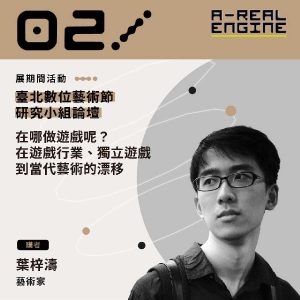
Topic: Where to do games? In the game industry, the drift from independent games to contemporary arts
Speaker: Zi-Tao YE (China)
Departing from his own personal and cultural experiences, the independent game researcher Zi-Tao Ye shares his roles of being the “outsider” and “field participant” as he has always been. His experiences, observations, and thoughts are all centered on games in the academic world, the Internet giants, independent game fields, self-media, and back to different fields of contemporary art. In addition, he will also exhibit the game prototypes in different fields and display forms, presenting trials different from the ancient times and other fields (including “The Shape of Time”, an Indiecade work that won the IGF Nuovo Award Honorable Mentions, together with its remake, as well as “Sword Zen” that won the Best Design Award in China Game Innovation Award. Also, the poetry machine “Make a Poem” produced 120 thousand “poems”.) Eventually, he’ll give his own understanding of game-contemporary art, exploring the possibilities of their mutual exchanges from the re-production and consumption of the fields to experimental games, theatre, Do It command art, and Fluxus.
Topic: Dark but Not Water – The Art of Sojourn
Speaker: Yuxiao CAI (aka Rhett TSAI, China)
Based on his latest video game creation “How Deep Is the Dark Water” (won the HUA Award for the 2023 Lumen Prize and was the finalist for the Independent Games Festival), Rhett Tsai shares the origin and creative process of this work and explores the re-imagination of the war theme and historical narrations. Also, being himself as the case of study, the possibility of game creation within the digital art context is derived, including how the artist applies his creative methods on the ontology of games and digital art medium, and the impact loop towards the creations.
In addition to an on-site demonstration, Rhett Tsai will also conduct an exploration of the aforementioned topic interweaved with work-related personal art practices and experiences as supplementation.


